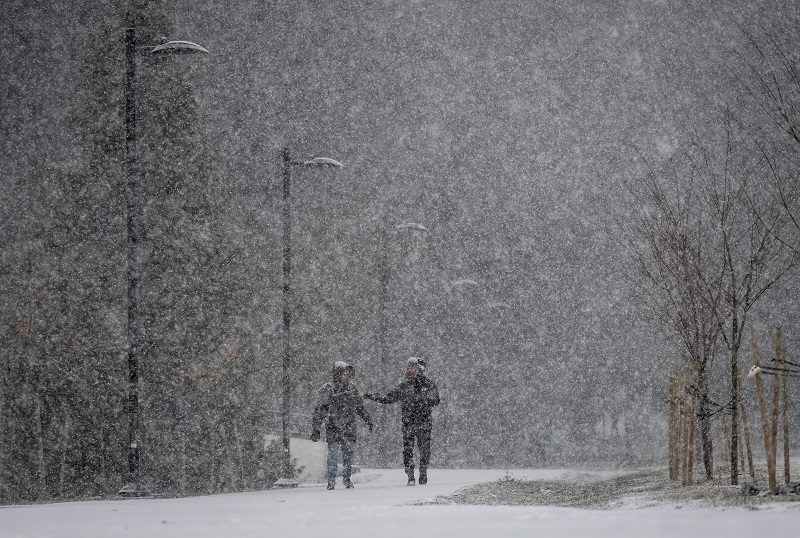How Canada’s winter weather predicts 2024 Cat claims

This winter clocked in as Canada’s warmest winter ever, and adjusters are already sounding the alarm that a winter with no or little snow could mean more wildfire claims over the rest of the year.
Snowpack in winter is one of the indicators of the severity of wildfires during the upcoming Cat season. Essentially, snowpack refers to the total amount of snow and ice on the ground. The longer the snowpack sticks around, the more saturated the ground is.
P&C industry and weather experts say snowpack is extremely low this winter, perhaps a byproduct of this winter’s extreme temperature swings.
Eastern and southern Alberta faced some of the worst drought conditions on record this January. Similarly, in British Columbia, snow levels were 44% below normal in the same month. On the other side of the country, Toronto lived through its warmest February this winter, with all but seven days clocking in at above normal temperatures.
The problem is, less snowpack (or snow drought) means the ground is generally drier and more flammable when wildfire season rolls around.
And after last year’s record wildfire season, with zombie fires still burning now, adjusters are wary about what this could mean going forward.
“On the [west] coast, we are seeing very mild and dry conditions which [could lead to] a potential earlier start to wildfire season,” says Michael Galea, Sedgwick’s senior vice president of national operations.
“I was speaking to our Alberta team about it,” says Anita Paulic, director of operations and catastrophe response at ClaimsPro. “They’re used to having the snow stick around from November until March and they’ve had no snow on the ground for weeks [this winter].
“The snowpack was regular in Winter 2022-23, and yet look at all those wildfires that we had in Alberta last year.”
In 2023, wildfires in Alberta burned 10 times more area than the five-year average.
“When I see it’s been extremely dry through the winter, especially in fire-prone areas like in the West, that gives me a little bit of a pause for concern,” says Caroline Floyd, director at Catastrophe Indices and Quantification Inc. (Cat IQ). However, she adds wildfire forecasting happens more accurately in a shorter time frame.
“The flip side of that is in areas where we’ve seen less snow and less snowpack develop over the winter, maybe that reduces some of the concerns for springtime flooding or widespread flood events,” says Floyd.
Climate change
Experts warn climate change will affect Canada’s winter weather going forward.
The nation is warming faster than the rest of the globe, Barrie Bonsal, senior research scientist at Environment & Climate Change Canada told attendees at the CatIQ Connect event in February.
Between the years 1948 to 2016, Canada warmed by 1.7 degrees Celsius, while the rest of the globe was alarmed by an increase of close to 0.8 degrees Celsius on average. In northern Canada and the Arctic regions, it’s closer to triple the global average (2.3 degrees Celsius).
“What has this warming done? It’s affected a lot of different things across Canada. We’re seeing more extreme heat, and less extreme cold,” said Bonsal, who works in the watershed hydrology and ecology research division at ECCC.
“We’re seeing less snow and ice cover for most of the year, thinning glaciers, and warmer, more acidic oceans,” he said.
“We’re seeing an earlier peak spring melt in any of the rivers across the country, falling permafrost in northern Canada and rising sea levels,” said Bonsal, “and because some of the future warming is unavoidable, these trends are going to continue into the future.”
On the other end of the spectrum, warmer air holds more moisture, and that means more precipitation, both rain and snow. And global warming doesn’t simply mean winters won’t be cold, Bonsal explained.
“We’re not as cold as we used to be, but we’re still a cold country. So we can still get a lot of extremes in snow, ice and winters,” he said. “[Winters] might get a little shorter, but it’s not going to disappear by any means. We’re still going to get that potential for these really cold snaps; they’re not going to be probably as frequent.”
Heavy snow falls as pedestrians walk through Central Park in Burnaby, B.C., on Tuesday, November 29, 2022. Snowfall, winter storm and arctic outflow warnings are in effect for most of British Columbia as a powerful storm packing frigid winds move through the province. THE CANADIAN PRESS/Darryl Dyck



